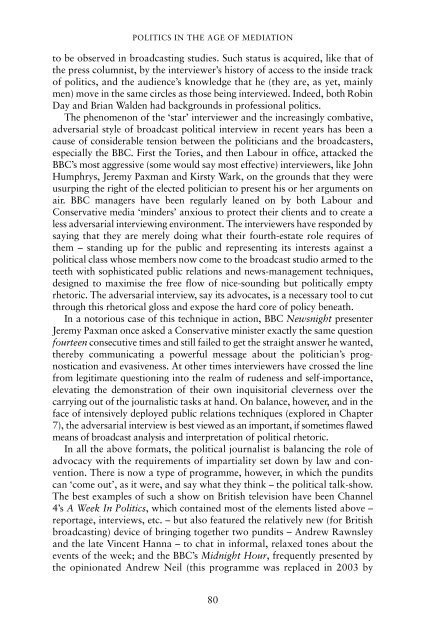20130412164339753295_book_an-introduction-to-political-communication
20130412164339753295_book_an-introduction-to-political-communication
20130412164339753295_book_an-introduction-to-political-communication
You also want an ePaper? Increase the reach of your titles
YUMPU automatically turns print PDFs into web optimized ePapers that Google loves.
POLITICS IN THE AGE OF MEDIATION<br />
<strong>to</strong> be observed in broadcasting studies. Such status is acquired, like that of<br />
the press columnist, by the interviewer’s his<strong>to</strong>ry of access <strong>to</strong> the inside track<br />
of politics, <strong>an</strong>d the audience’s knowledge that he (they are, as yet, mainly<br />
men) move in the same circles as those being interviewed. Indeed, both Robin<br />
Day <strong>an</strong>d Bri<strong>an</strong> Walden had backgrounds in professional politics.<br />
The phenomenon of the ‘star’ interviewer <strong>an</strong>d the increasingly combative,<br />
adversarial style of broadcast <strong>political</strong> interview in recent years has been a<br />
cause of considerable tension between the politici<strong>an</strong>s <strong>an</strong>d the broadcasters,<br />
especially the BBC. First the Tories, <strong>an</strong>d then Labour in office, attacked the<br />
BBC’s most aggressive (some would say most effective) interviewers, like John<br />
Humphrys, Jeremy Paxm<strong>an</strong> <strong>an</strong>d Kirsty Wark, on the grounds that they were<br />
usurping the right of the elected politici<strong>an</strong> <strong>to</strong> present his or her arguments on<br />
air. BBC m<strong>an</strong>agers have been regularly le<strong>an</strong>ed on by both Labour <strong>an</strong>d<br />
Conservative media ‘minders’ <strong>an</strong>xious <strong>to</strong> protect their clients <strong>an</strong>d <strong>to</strong> create a<br />
less adversarial interviewing environment. The interviewers have responded by<br />
saying that they are merely doing what their fourth-estate role requires of<br />
them – st<strong>an</strong>ding up for the public <strong>an</strong>d representing its interests against a<br />
<strong>political</strong> class whose members now come <strong>to</strong> the broadcast studio armed <strong>to</strong> the<br />
teeth with sophisticated public relations <strong>an</strong>d news-m<strong>an</strong>agement techniques,<br />
designed <strong>to</strong> maximise the free flow of nice-sounding but <strong>political</strong>ly empty<br />
rhe<strong>to</strong>ric. The adversarial interview, say its advocates, is a necessary <strong>to</strong>ol <strong>to</strong> cut<br />
through this rhe<strong>to</strong>rical gloss <strong>an</strong>d expose the hard core of policy beneath.<br />
In a no<strong>to</strong>rious case of this technique in action, BBC Newsnight presenter<br />
Jeremy Paxm<strong>an</strong> once asked a Conservative minister exactly the same question<br />
fourteen consecutive times <strong>an</strong>d still failed <strong>to</strong> get the straight <strong>an</strong>swer he w<strong>an</strong>ted,<br />
thereby communicating a powerful message about the politici<strong>an</strong>’s prognostication<br />
<strong>an</strong>d evasiveness. At other times interviewers have crossed the line<br />
from legitimate questioning in<strong>to</strong> the realm of rudeness <strong>an</strong>d self-import<strong>an</strong>ce,<br />
elevating the demonstration of their own inquisi<strong>to</strong>rial cleverness over the<br />
carrying out of the journalistic tasks at h<strong>an</strong>d. On bal<strong>an</strong>ce, however, <strong>an</strong>d in the<br />
face of intensively deployed public relations techniques (explored in Chapter<br />
7), the adversarial interview is best viewed as <strong>an</strong> import<strong>an</strong>t, if sometimes flawed<br />
me<strong>an</strong>s of broadcast <strong>an</strong>alysis <strong>an</strong>d interpretation of <strong>political</strong> rhe<strong>to</strong>ric.<br />
In all the above formats, the <strong>political</strong> journalist is bal<strong>an</strong>cing the role of<br />
advocacy with the requirements of impartiality set down by law <strong>an</strong>d convention.<br />
There is now a type of programme, however, in which the pundits<br />
c<strong>an</strong> ‘come out’, as it were, <strong>an</strong>d say what they think – the <strong>political</strong> talk-show.<br />
The best examples of such a show on British television have been Ch<strong>an</strong>nel<br />
4’s A Week In Politics, which contained most of the elements listed above –<br />
reportage, interviews, etc. – but also featured the relatively new (for British<br />
broadcasting) device of bringing <strong>to</strong>gether two pundits – Andrew Rawnsley<br />
<strong>an</strong>d the late Vincent H<strong>an</strong>na – <strong>to</strong> chat in informal, relaxed <strong>to</strong>nes about the<br />
events of the week; <strong>an</strong>d the BBC’s Midnight Hour, frequently presented by<br />
the opinionated Andrew Neil (this programme was replaced in 2003 by<br />
80
















